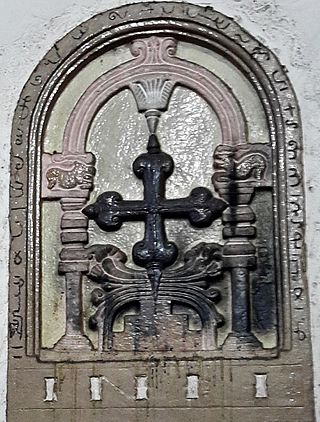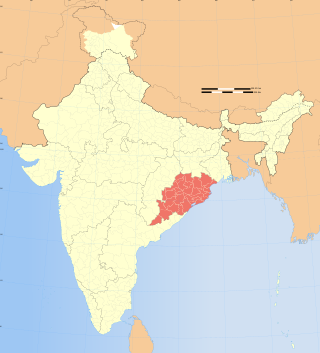Related Research Articles
Persecution of Christians in the post–Cold War era refers to the persecution of Christians from 1989 to the present. Part of a global problem of religious persecution, persecution of Christians in this era is taking place in Africa, the Americas, Europe, Asia and Middle East.

The Nocte people, also known as the Nocte Naga, are a Tibeto-Burmese ethnic group primarily living in Northeast Indian state of Arunachal Pradesh. They number about 111,679, mainly found in the Patkai hills of Tirap district of Arunachal Pradesh, India. Ethnically related to the Konyak Naga, their origins can be traced back to the Hukong Valley in Myanmar, where they migrated from between the 1670 and 1700.

The Goa Inquisition was an extension of the Portuguese Inquisition in Portuguese India. Its objective was to enforce Catholic Orthodoxy and allegiance to the Apostolic See of Rome (Pontifex). Conversions took place through the Goan Inquisition with the persecution of Hindus and the destruction of Hindu temples. The inquisition primarily focused on the New Christians accused of secretly practicing their former religions, and Old Christians accused of involvement in the Protestant Revolution of the 16th century. Also, among the offenders, were those suspected of committing sodomy, they were given the second most harsh punishments. The inquisition was established in 1560, briefly suppressed from 1774 to 1778, continued thereafter until it was finally abolished in 1812. Forced conversions led to crypto-Hinduism with those accused of it imprisoned and depending on the criminal charge, could even be sentenced to death if convicted. The Inquisitors also seized and burnt any books written in Sanskrit, Dutch, English, or Konkani, on the suspicions that they contained deviationist or Protestant material.

Christianity is India's third-largest religion with about 26 million adherents, making up 2.3 percent of the population as of the 2011 census. The written records of St Thomas Christians mention that Christianity was introduced to the Indian subcontinent by Thomas the Apostle, who sailed to the Malabar region in 52 AD.

Christianity is the third largest religion in Pakistan, making up about 1.27% of the population according to the 2017 Census. Of these, approximately half are Catholic and half Protestant. A small number of Eastern Orthodox Christians, and Oriental Orthodox Christians also live in Pakistan.
Chuhra, also known as Bhanghi and Balmiki, is a Dalit caste in India and Pakistan. Populated regions include the Punjab region of India and Pakistan, as well as Uttar Pradesh in India, among other parts of the Indian subcontinent such as southern India. Their traditional occupation is sweeping, a "polluting" occupation that caused them to be considered untouchables in the caste system.
Forced conversion is the adoption of a religion or irreligion under duress. Someone who has been forced to convert to a different religion or irreligion may continue, covertly, to adhere to the beliefs and practices which were originally held, while outwardly behaving as a convert. Crypto-Jews, Crypto-Christians, Crypto-Muslims and Crypto-Pagans are historical examples of the latter.
Growth of religion involves the spread of individual religions and the increase in the numbers of religious adherents around the world. In sociology, desecularization is the proliferation or growth of religion, most commonly after a period of previous secularization. Statistics commonly measure the absolute number of adherents, the percentage of the absolute growth per-year, and the growth of converts in the world.
The caste system among South Asian Christians often reflects stratification by sect, location, and the caste of their predecessors. There exists evidence to show that Christian individuals have mobility within their respective castes. But, in some cases, social inertia caused by their old traditions and biases against other castes remain, causing caste system to persist among South Asian Christians, to some extent. Christian priests, nuns, Dalits and similar groups are found in India, Pakistan, Bangladesh, and Nepal.
Protestants in India are a minority and a sub-section of Christians in India and also to a certain extent the Christians in Pakistan before the Partition of India, that adhere to some or all of the doctrines of Protestantism. Protestants in India are a small minority in a predominantly Hindu majority country, but form majorities in the north-eastern states of Meghalaya, Mizoram and Nagaland and significant minorities in Konkan division, Bengal, Kerala and Tamil Nadu, with various communities in east coast and northern states. Protestants today trace their heritage back to the Protestant reformation of the 16th century. There are an estimated 20 million Protestants and 16 million Pentecostals in India.

Christianity is Indonesia's second-largest religion, after Islam. Indonesia also has the second-largest Christian population in Southeast Asia after the Philippines, the largest Protestant population in Southeast Asia, and the third-largest Christian population in Asia after the Philippines and China, followed by India. Indonesia also has the second-largest Christian population in the Muslim world, after Nigeria, followed by Egypt. Indonesia's 29.1 million Christians constituted 10.49% of the country's population in 2022, with 7.43% Protestant and 3.06% Catholic. Some provinces in Indonesia are majority Christian. In Indonesia, the word Kristen refers to Protestantism, while Catholicism is referred to as Katolik. In the 21st century the rate of growth and spread of Christianity has increased, especially among the Chinese minority.

Anti-Christian violence in India is religiously motivated violence against Christians in India. Human Rights Watch has classified violence against Christians in India as a tactic used by the right-wing Sangh Parivar organizations to encourage and exploit communal violence in furtherance of their political ends. The acts of violence include arson of churches, conversion of Christians by force, physical violence, sexual assaults, murders, rapes, and the destruction of Christian schools, colleges, and cemeteries.

Religious violence in Odisha consists of civil unrest and riots in the remote forest region surrounding the Kandhamal district in the western parts of the Indian state of Odisha.
Nepal is a secular state under the Constitution of Nepal 2015, where "secular" means religious, cultural freedoms, including protection of religion and culture handed down from time immemorial.

Christianity is the largest religion in Botswana. However, the country is officially secular and allows freedom of religious practice.
The Presbyterian Church of India (PCI) is a mainline Protestant church based in India, with over one and a half million adherents, mostly in Northeast India. It is one of the largest Christian denominations in that region.

Christianity is the third largest religion in Assam, a state in the north-eastern region of India. The total population of Christians in the state is 1,165,867, which according to the 2011 census comprises about 3.74% of the state's total population. After Islam, Christianity is also the second-fastest growing religion of Assam. The largest concentration of Christians in Assam can be found in the Dima Hasao District, where Christians number approximately 30% of the population. The second largest concentration is in the Karbi Anglong district where they form approximately 16.5% of the population.
Jadonang Malangmei (1905-1931), popularly known as Haipou Jadonang, was a Naga spiritual leader and political activist from Manipur, British India. He established the Heraka religious movement, which was based on the ancestral Naga religion, and declared himself to be the "messiah king" of the Nagas. His movement was widespread in the Zeliangrong territory before the conversion to Christianity. He also espoused the cause of an independent Naga kingdom, which brought him in conflict with the colonial British rulers of India. He was hanged by the British in 1931, and succeeded by his cousin Rani Gaidinliu.
Ghar Wapsi is the programme of religious conversion to Hinduism from Islam, Christianity, and other religions in India conducted by Indian Hindu nationalist organisations Vishva Hindu Parishad (VHP), Rashtriya Swayamsevak Sangh (RSS) and their allies. The term owes to the Hindu nationalist ideology that all people of India are ancestrally Hindu and, hence, conversion to Hinduism is one of "returning home" to their ancestral roots.
Dharm Jagaran Samiti (DJS) is an Indian organisation working to convert Muslims and Christians to Hinduism, with a coordinating committee called "Dharam Jagaran Samanvay Samiti". It is a right-wing Hindu nationalist organisation.
References
- ↑ "Christianity threat looms over Bhuvan Pahar - Assam Times". www.assamtimes.org.